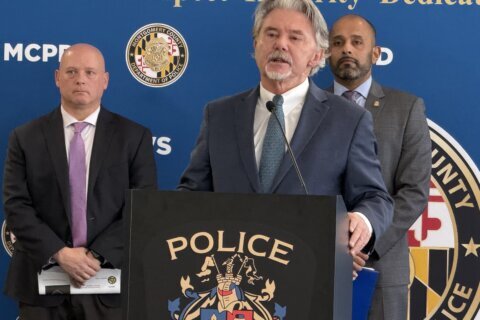WASHINGTON — Noah’s Law has only been in effect for just over two weeks in Maryland, but Montgomery County’s top prosecutor wants to keep expanding the use of interlock devices.
“The fact that we have substantially expanded the category of individuals that have to install the device, it’s going to become so much more normal in our courts to use it,” Montgomery County State’s Attorney John McCarthy said. “We realize that in many instances, a lot of these individuals who have had drunk driving offenses really have addiction issues.”
He would like to see judges and prosecutors use these devices for more than just drunk driving offenders, and for other alcohol-fueled crimes, as well.
In part, it’s to help those addicted to alcohol get better control, and it is also designed to prevent a future alcohol-involved tragedy.
“For instance, if you had principally an individual who got involved in domestic violence situations because they could go out, they had an alcohol problem and they became abusive when intoxicated, it’s not a drunk driving offense,” McCarthy said. “But if the core issue really is alcohol abuse, perhaps the best thing to do to not only prevent repeated acts of domestic violence, but also make sure that individual is not driving the vehicle, is to ask the court to exercise their discretion and install the interlock device in the instance of the domestic violence case.”
He intends to seek the installation of these devices more often.
“I think it will make judges, prosecutors and others look at more creative uses of the interlock device, even beyond the stated goal of the piece of legislation that was actually adopted by the legislature,” McCarthy said. “Once the interlock becomes something that is done regularly in courtrooms every day, I think it’s going to become obvious to people that there are uses of that device that make sense in all kinds of related criminal matters.”
The prosecutor said that research has shown that the installation of interlock devices in the vehicles of convicted drunk drivers decreased the chance of them becoming repeat offenders.
Alcohol addiction is a hard battle to fight, especially when it leads to tragedies such as the death of Montgomery County police officer Noah Leotta in late 2015.
“If you have an individual who has had a catastrophic kind of experience, where they have actually taken human life and they cannot control their desires to drive a car, you understand how powerful this is,” McCarthy said. “Even if they may really not want to drive, in many instances, the addiction drives them to drive.”
The state’s attorney said the passing and enactment of Noah’s Law has been a big step forward, but there are still many gaps that remain to be filled.
“In Maryland, we have this extraordinary device where you can actually be convicted of something and then be given what they call either a [Section] 641 or a PBJ [probation before judgment]. Effectively, the points don’t go against your record and you don’t get a formal conviction. If the court feels that it’s in the best interest of the community and the individual charge, the court has the authority to grant this 641 release,” McCarthy said.
McCarthy said most first-time offenders in non-aggravated drunk driving cases get a PBJ and many of these people are not required to have an interlock device be installed. The prosecutor is pushing for all offenders, regardless of whether they were granted a PBJ or were formally convicted, to have an interlock device be installed.
As for the possibility of more legislation getting passed, McCarthy has his doubts.
“Unfortunately, really progressive kinds of things like the expansion of the ignition interlock, so often only make progress when something tragic occurs.”






